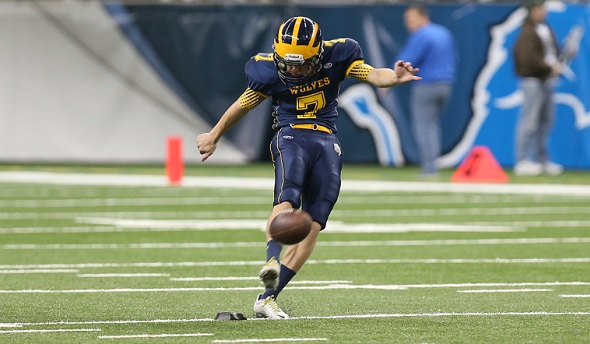
Catch These New Rules as Fall Kicks Off
August 7, 2014
By Geoff Kimmerly
Second Half editor
The first practices of 2014-15 begin next week for approximately 110,000 student-athletes taking part in eight sports in which the Michigan High School Athletic Association sponsors postseason tournaments, with nearly 41,000 football players practicing under a new policy in that sport aimed at continuing to improve player safety.
The new practice policy was proposed by a Football Task Force made up of coaches, administrators and MHSAA staff which met during 2012 and 2013, and approved by the MHSAA’s Representative Council at its Winter Meeting on March 21.
The modifications are meant to promote heat acclimatization and limit helmet-to-helmet contact during practices. They include:
- During the first week of practice, only helmets are allowed the first two days, only shoulder pads may be added on the third and fourth days, and full pads may not be worn until the fifth day of team practice.
- Before the first regular-season game, schools may not schedule more than one “collision” practice in a day. A collision practice is defined as one in which there is live, game-speed, player-versus-player contact in pads involving any number of players.
- After the first regular-season game, teams may conduct no more than two collision practice days in any week, Monday through Sunday.
- No single football practice may exceed three hours, and the total practice time for days with multiple practice sessions may not exceed five hours. Neither strength/weight training activities nor video/classroom sessions are considered practice for the purposes of the three or five-hour limits.
Previously, schools were required to conduct at least three days of practice without pads before beginning contact. The change to four days for gradual addition of pads was added to assist athletes in acclimating to being physically active in hot weather. Guidelines reducing the amount of collision practice go hand in hand with rules changes that have been made to reduce helmet-to-helmet contact in game situations. The policies in detail can be found on the Football page of the MHSAA Website.
“We think these new policies, with respect to the number of collision practices there can be before the first game, and after the first game, really are where 85 to 90 percent of our coaches already were,” said John E. “Jack” Roberts, executive director of the MHSAA. “This new policy sends a signal to that 10 to 15 percent to get on board with the rest of us to make football just as safe as it can possibly be.”
Practice in football must begin on August 11 for all schools wishing to begin regular-season games the weekend of August 28-30. Schools must have 12 days of preseason practice at all levels before their first game, and those 12 days of practice may not occur before 16 calendar days.
Practice sessions for all other sports begin on Wednesday (August 13). In golf and tennis, competition may commence no earlier than after three separate days of team practice, and not before seven calendar days. The first day competition may take place in golf and tennis is August 20. In all other fall sports, contests can take place after seven days of practice for the team and not before nine calendar days. The first day competition may take place in cross country, tennis, soccer, swimming and diving, and volleyball is August 22.
Only one football date precedes Labor Day, and most varsity games will take place on Thursday, August 28, that week. Subvarsity competition may begin on Wednesday, August 27. In Week 1, 255 games will be played on Thursday, 53 contests will be played on Friday, and five games will be played on Saturday.
Continuing the focus on player safety, a number of rules changes were made in football for 2014:
- Rules were added restricting targeting of opponent and illegal helmet contact with defenseless players, with both resulting in 15-yard penalties. Targeting is defined as taking aim at an opponent with the helmet, forearm, hand, fist, elbow or shoulder to initiate contact above the shoulders and with an intent beyond making a legal tackle or block, or playing the ball. A defenseless player can be considered one no longer involved in a play, a runner whose progress has been stopped, a player focused on receiving a kick or a receiver who has given up on an errant pass, or a player already on the ground.
- Illegal contact to a quarterback now will be considered roughing the passer, and the offense will receive an automatic first down in addition to the previous 15 yards from the penalty.
- On kickoffs, the kicking team must have at least four players on either side of the kicker, and no kicking team players except for the kicker may line up more than five yards behind the free-kick line. These changes were made to improve safety by balancing the kicking formation and shortening the potential run-up by kicking team players heading down the field to tackle the ball carrier.
A number of significant rules changes will go into effect for other fall sports:
- In cross country, the ban on wearing jewelry has been lifted (and also for track and field in the spring). The National Federation of State High School Associations deemed the ban unnecessary in these two sports because there is little risk of injury with minimal contact between competitors. Elimination of the rule will allow officials to further focus on the competition.
- In soccer, Michigan has adopted the National Federation rule stating home teams must wear solid white jerseys and socks, with visiting teams in dark jerseys and socks (dark defined as any color contrasting white). Also, officials may now wear green and blue shirts in addition to red and black as alternates to the primary yellow shirt with black pinstripes.
- Also for soccer, both field players and goalkeepers must now leave the field when injured and the referee has stopped the clock. Previously, an injured goalkeeper was not required to leave the game when the referee stopped the clock; going forward, the keeper must be replaced.
- In swimming and diving, one change affects the beginning of races and another impacts a specific event. The use of starter’s pistols is now prohibited; starters must use an alternative sounding device to start races. Additionally, in the backstroke, a swimmer may not submerge his or her entire body after the start except for during turns. The swimmer must remain on or above the water surface on the finish, eliminating the abuse of submerging well before touching the wall. This change also applies to the finish of the backstroke leg of the individual medley.
The 2014 Fall campaign culminates with postseason tournaments beginning with the Upper Peninsula Girls Tennis Finals the week of Sept. 29, and wraps up with the 11-Player Football Playoff Finals on Nov. 28-29. Here is a complete list of fall tournament dates:
Cross Country:
U.P. Finals – Oct. 18
L.P. Regionals – Oct. 24 or 25
L.P. Finals – Nov. 1
11-Player Football:
Selection Sunday – Oct. 26
Pre-Districts – Oct. 31 or Nov. 1
District Finals – Nov. 7 or 8
Regional Finals – Nov. 14 or 15
Semifinals – Nov. 22
Finals – Nov. 28-29
8-Player Football:
Selection Sunday – Oct. 26
Regional Semifinals – Oct. 31 or Nov. 1
Regional Finals – Nov. 7 or 8
Semifinals – Nov. 15
Finals – Nov. 21
L.P. Girls Golf:
Regionals – Oct. 8 or 9 or 10 or 11
Finals – Oct. 17-18
Soccer:
Boys L.P. Districts – Oct. 13-18
Boys L.P. Regionals – Oct. 21-25
Boys L.P. Semifinals – Oct. 29
Boys L.P. Finals – Nov. 1
L.P. Girls Swimming & Diving
Diving Regionals – Nov. 13
Swimming/Diving Finals – Nov. 21-22
Tennis:
U.P. Girls Finals – Oct. 1 or 2 or 3 or 4
L.P. Boys Regionals – Oct. 9 or 10 or 11
L.P. Finals – Oct. 17-18
Girls Volleyball:
Districts – Nov. 3-8
Regionals – Nov. 11 & 13
Quarterfinals – Nov. 18
Semifinals – Nov. 20-21
Finals – Nov. 22
The MHSAA is a private, not-for-profit corporation of voluntary membership by more than 1,500 public and private senior high schools and junior high/middle schools which exists to develop common rules for athletic eligibility and competition. No government funds or tax dollars support the MHSAA, which was the first such association nationally to not accept membership dues or tournament entry fees from schools. Member schools which enforce these rules are permitted to participate in MHSAA tournaments, which attract more than 1.4 million spectators each year.
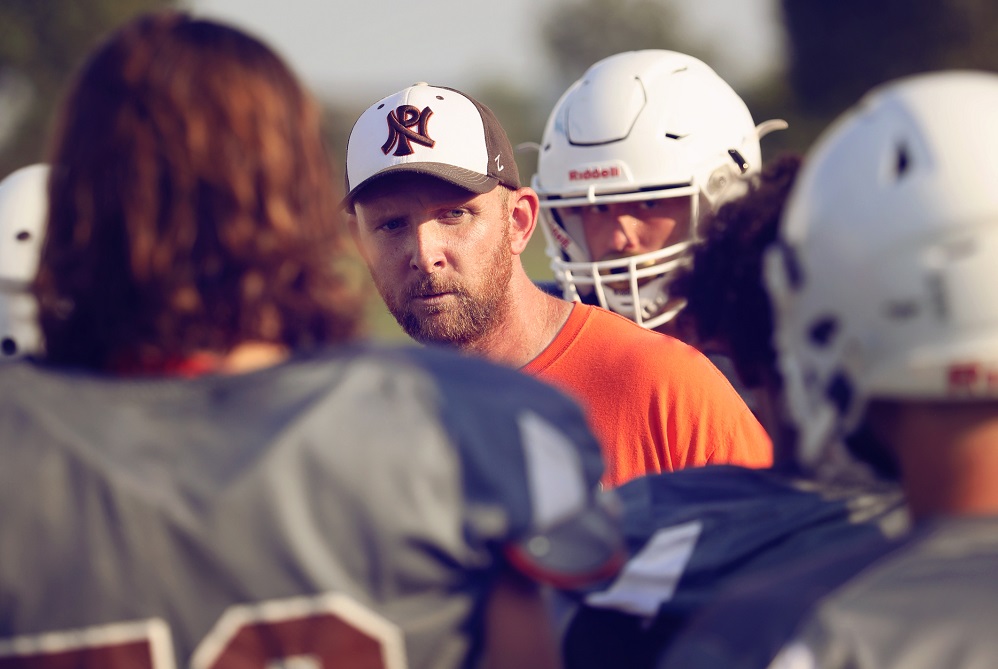
Portage Northern Coach Nurturing New Roots After Arriving from Crosstown Rival
By
Pam Shebest
Special for MHSAA.com
October 19, 2021
PORTAGE — When Kurt Twichell was hired as Portage Northern’s head football coach last May, he had some serious closet cleaning to do.
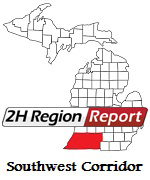 As an assistant coach at crosstown rival Portage Central, his wardrobe was filled with blue and gold.
As an assistant coach at crosstown rival Portage Central, his wardrobe was filled with blue and gold.
“I had to clean out probably 80 percent of my closet,” Twichell said, laughing. “Being a phys. ed. guy, I had quite a bit of blue and gold PC stuff.
“That all went into a big old bag, and I actually donated it back to them. I had a lot of work to do from a wardrobe perspective, no doubt about that.”
Twichell is nearing the conclusion of his first season as a head coach, with Portage Northern 2-6 this fall heading into its season finale Friday against Kalamazoo Central.
He had spent the previous seven seasons at Portage Central, finishing his tenure with the Mustangs last fall as their defensive coordinator. Across town at that time, Pete Schermerhorn was completing his 27th and final season leading the Huskies’ football program – and after some thought, Twichell applied to be his replacement and was named Northern’s next coach this spring.
Twichell made sure to wear orange when he met with his new team for the first time.
If he had worn any hint of blue, “We wouldn’t have let him in,” said senior and two-way player Xavier Thomas with a big grin.
Twichell said he understood why players were apprehensive.
 “I think naturally, with teenagers, it was like what the heck is going on?” he said. “We hired a guy from Portage Central. This is crazy.”
“I think naturally, with teenagers, it was like what the heck is going on?” he said. “We hired a guy from Portage Central. This is crazy.”
Twichell said he worked very hard to establish a rapport with the players.
“You’re trying to build trust within your program,” he said. “As soon as I accepted this job, I’m diving full on in, orange, brown and white as a Huskie.”
Thomas said players did not know what to expect.
“The initial feeling, we were a little nervous as far as what his path for us was going to be. Having come from that school, would he hold a grudge against us or not?” he recalled.
“After meeting him and sitting down and having a conversation with him, we understood that he was fully on the path of Portage Northern Huskies. He fully supports all of our sports programs, not just football. He’s just a great guy that we need in our community.”
Climbing the ladder
Twichell said his love of football started at Haslett High School in “an up-and-coming program” under head coach Charlie Otlewski and defensive coordinator Rob Porritt, adding “Those are my guys.”
After a football injury at Hope College derailed his playing career, Twichell transferred to Michigan State as a “regular student” and started working with Otlewski and Haslett’s football team.
“I spent a couple years there doing it for fun,” Twichell said. “I ended up loving it so much.”
He scrapped plans for med school and earned a teaching degree.
Taking his first job at White Pigeon, “I was just a young guy looking for any job I could get.”
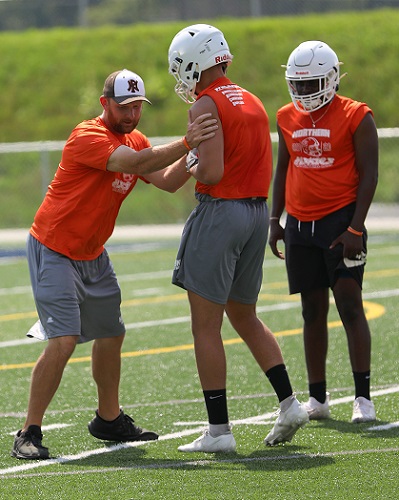 Two years later he contacted Enders, who happened to have a job available. Twichell spent the next seven years at Central, working his way up to defensive coordinator.
Two years later he contacted Enders, who happened to have a job available. Twichell spent the next seven years at Central, working his way up to defensive coordinator.
When he heard about the opening at Northern, which included a teaching position, he was not sure about applying.
“I was very, very rooted with Central and really enjoyed the staff and the opportunity they gave me to work my way up to d-coordinator,” he said. “When this job came up, I actually sat down and thought about it for more than three seconds. Being a head coach is a goal of mine.”
Twichell’s wife, Kate, coaches the Portage schools’ co-op girls lacrosse team and he said the family, including 3-year-old twins, are happy living in the community.
Ironically, shortly after accepting the Northern coaching job, his wife left Hackett Catholic Prep to teach Spanish and English at Portage Central.
That makes for some interesting family dynamics, especially during the rivalry game.
“I try to push the (twins) one way; Kate doesn’t necessarily try to push them either way but we still hear the ‘M’ (Mustangs) word after “Go” from the kids,” Kurt said. “They’ll say every now and then, Go Mustangs or Go Huskies. Kate just cheers for ‘no injuries,’ the way she puts it.”
No longer just Xs and Os
“The biggest change is how much of your role has almost nothing to do with football from an Xs and Os perspective or from an actual coaching kids perspective,” Twichell said.
“It’s community relations, youth involvement, financial management, recruiting.”
He said it is like the iceberg analogy.
“People just see Friday nights and results, but below the surface is all these components that go into building a good program,” he said. “Coach Shermerhorn left a pretty good foundation in terms of that iceberg, but I definitely want to put my own spin on things.”
During the day, Twichell is in the weight room, teaching a full day of power lifting.
The academic classes are open to all students, and Twichell hopes to resurrect the school’s power lifting team.
Chris Riker, Northern’s athletic director, said when hiring a coach, it is not where he coached but if he was a good fit for the program.
“We had some outstanding candidates and Kurt had a good plan on developing culture, developing not just the football player but the whole athlete, the whole person,” Riker said. “Academics were important. Getting involved in your community is important, and being a role model for the younger kids is important as well as being a good football player, good person.”
Riker said the team is very involved with the community.
“He’s done some things with our kids and Rocket Football to establish that connection with the youth program,” he said.
He added that Twichell and Enders collaborated on Camp Ability in July.
“It’s a camp for special needs kids who want to be involved with football,” Riker said. “It’s pretty cool to get out there and see kids who aren’t involved in football be that excited and be next to our football players. Kids had big smiles on their faces, just to be able to try on the shoulder pads and football jerseys.”
The children also ran drills, tossed footballs and ran for touchdowns, helped by players from both teams.
Not just another game
The Huskies are still settling into a new system (although a highlight was a Week 4 win over Division 3 No. 10 Stevensville Lakeshore). But Twichell has surrounded himself with solid support, carrying over several assistants from Schermerhorn’s staff.
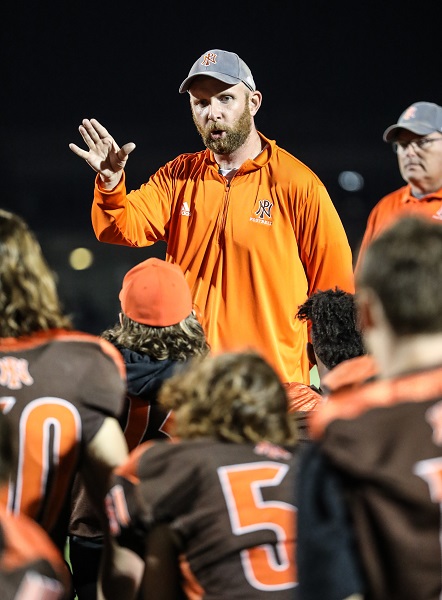 “Those guys have been phenomenal,” Twichell said. “Just about every coach who wanted to come back did.”
“Those guys have been phenomenal,” Twichell said. “Just about every coach who wanted to come back did.”
As the defensive coordinator at Portage Central, Twichell was familiar with Tom Laskarides, Schermerhorn’s defensive coordinator.
“People probably wondered what that was going to look like, but I have nothing but admiration and respect for Tom,” Twichell said. “We also brought back Mike McGuire who was on staff here probably 10 years ago. He’s a quarterbacks, offensive guy and a former head coach himself. That’s been huge to have these guys.”
Twichell said the team lost several outstanding players to graduation the last three years.
“When you go through losing groups like that, there’s going to be a transition there, regardless of a new coach,” he said. “We have a very young team, an inexperienced team.”
One game on Twichell’s radar this fall was the battle of the Portages, a game Northern lost, 33-17, two weeks ago.
“I’m not sure there’s a playbook out there that anybody’s ever written,” he said. “Not just competing against players that you had physically coached and had invested so much in their lives, but you know their families, their career aspirations, especially that senior class.”
Twichell said the “coach speak” was that it was just another game.
But the emotions surfaced during the postgame handshakes.
“Lots of hugs and some emotions. It was a good feeling from a human standpoint, but obviously we’re disappointed the game didn’t go the way we wanted it to,” he said.
Thomas said his coach warned the players that the game would generate more than the usual hype.
“He let us know there would be a lot of attention brought on us from the media, being (Central head coach Mick) Enders vs. Twichell,” Thomas said.
“But with his preparation, we were pretty dialed into the game. Hopefully we can take the things we learned from that game and assess them moving forward so the things that happened in that game won’t happen again.”
 Pam Shebest served as a sportswriter at the Kalamazoo Gazette from 1985-2009 after 11 years part-time with the Gazette while teaching French and English at White Pigeon High School. She can be reached at [email protected] with story ideas for Calhoun, Kalamazoo and Van Buren counties.
Pam Shebest served as a sportswriter at the Kalamazoo Gazette from 1985-2009 after 11 years part-time with the Gazette while teaching French and English at White Pigeon High School. She can be reached at [email protected] with story ideas for Calhoun, Kalamazoo and Van Buren counties.
PHOTOS (Top) First-year Portage Northern varsity football coach Kurt Twichell talks with his team this season. (2) Portage Northern senior Xavier Thomas, top, and athletic director Chris Riker. (3) Twichell, left, works with his players during a practice this fall. (4) Twichell addresses the Huskies after a game. (Action photos by Jason Altwies; head shots by Pam Shebest.)

